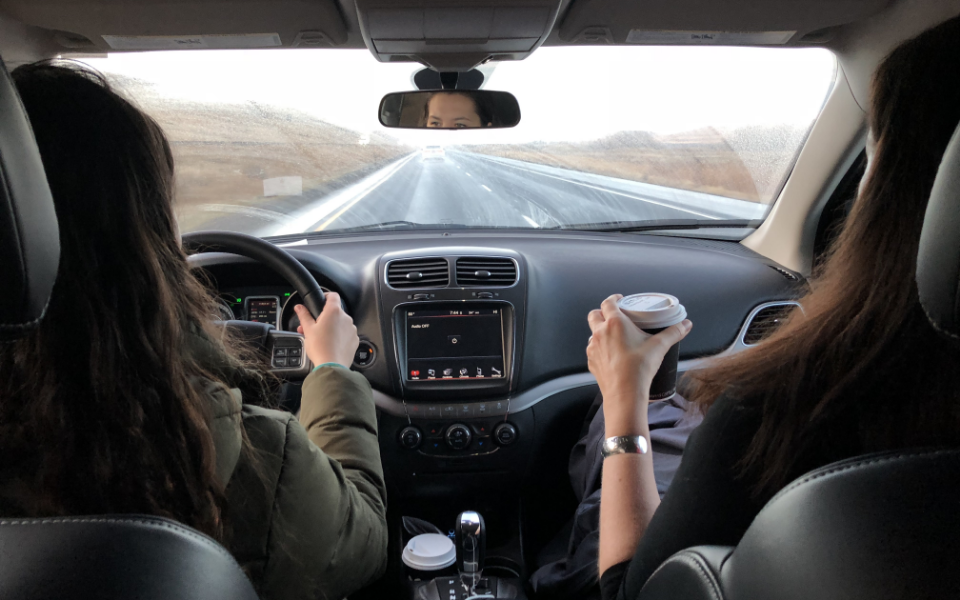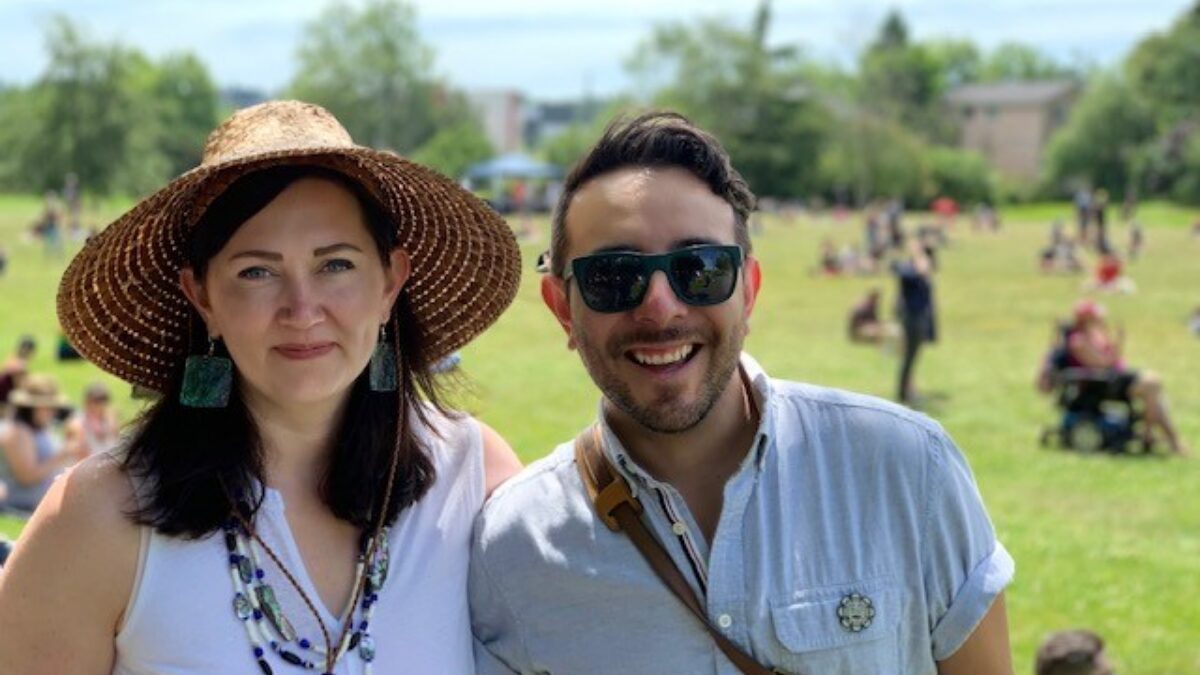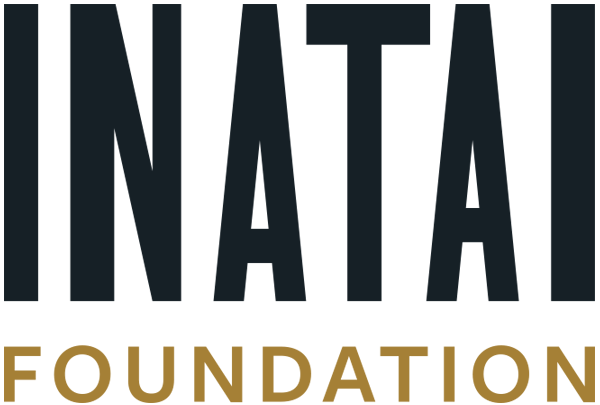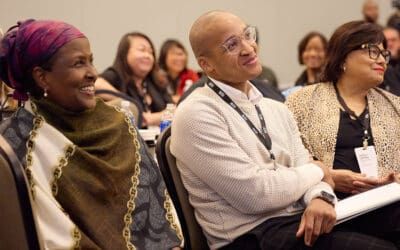Until Feb. 1, 2023, we were Group Health Foundation. This post was written under our former identity. To learn more about our new name, read our announcement here.

On the road during our first rounds of community visits in 2019.
Introducing our updated values and mission statement
Something we struggle with at GHF is the disconnect between what people think we do and what we actually do—which means our phone calls and emails sometimes go unanswered.
This has been the case since we were a brand new organization planning our first rounds of community visits across Washington and remains so even though we are a few years into our work. Determined to build relationships with community leaders and organizations in every corner of Washington, we called, emailed, sent notes, and asked colleagues to make introductions, often to be received with confusion. Many assumed, because of our name and our mission focused on health equity, that we were selling health insurance or seeking to fund medical interventions.
Time and again, communities shared they didn’t think they would qualify for a grant because they were not in health care or didn’t see their work as fitting into a public health framework. Said simply: they didn’t see themselves in the words we were using. Over time we noticed organizations shoehorn their work into a public health framework, presumably to make themselves appear more “eligible” for funding. A strategic planning session or cultural celebration, for example, might include a cancer screening—or some other change to fit what they thought we wanted to see.
Even our friends and colleagues in public health and medicine were confused. Does achieving “health equity” mean awarding underrepresented students with scholarships to attend medical school? Is it a brochure offering medical advice translated into a non-English language? Again, people of all backgrounds across the state told us that this frame was confusing, unclear, and did not mean much to the leaders, organizations and communities that we depend on to achieve our mission.
We have spent a lot of time explaining our definition of health equity and making the case that health is so much more than health care. Despite our best efforts, the language we were using just wasn’t big enough to hold all the dreams of Washingtonians. These words were not big enough to describe all the brilliant, visionary, and strategic ways people want to improve their lives, their communities, and shift power so we can all live free from injustice.
That is the short story of why we rewrote our values and introduced a new mission statement: transforming the balance of power to ensure equity and racial justice across Washington and beyond.
The long version of the story includes thousands of insights we heard during community visits, conversations with hundreds of organizations, feedback from convenings and regional gatherings, as well as the countless hours our team has spent with grantee organizations across the state.
From the beginning, our board and team have prioritized time at our meetings to listen and learn, to understand how we can build trusting relationships with Washington communities. We are incredibly grateful to our first teachers. Leaders and organizations representing rural, suburban, unincorporated, and urban geographies have helped us understand how different communities express their priorities and reminded us that leadership, vision, and determination for equity exist in every pocket of our state. The knowledge, insight, and expertise of Black, Indigenous, and people-of-color leaders, tribal nations and Native communities, people living with low incomes, members of the LGBTQ+ community, and people with disabilities have fundamentally changed who we are and how we think about our work.

My colleague Eddie Moreno and I at a 2020 Juneteenth celebration in Seattle’s Judkins Park.
With these voices at the center of our thinking and the recognition that we were beginning to set our 50-year vision, we knew we needed to adjust our values and mission statement to match who we are today, reflect the wisdom so many have gifted us, and allow us to introduce ourselves more clearly and accessibly. When we adopted our first set of values, equity agreements, and mission statement centering health equity, they were the best words we knew at the time. We hoped they were bold enough to resonate with the communities we are accountable to. The process of re-examining and rewriting them helped us see how much bolder and more powerful they could be.
As a public health professional, I have needed to update my language many times over and still cringe looking back at some of the language choices I have made. Even with those hard lessons, it is important to say that as part of this process, the word “equity” gave us some emotional pause. I have lost count of the number of times people have shared with us that “equity” has been watered down and whitewashed—turned into nothingness. Organizations and community leaders shared their fear that philanthropy will overuse the word, and they will once again have to find new language to describe a fair and just world. We do not want to be part of the troubling trend in our sector, which is often too afraid to acknowledge that equity is only possible with an explicit focus on racial justice.
GHF will keep evolving over time as we continue to learn and grow. If we are doing our work well and truly listening, then we should continue to improve and update our language to reflect emerging innovations and understandings of our work, our state, and the people who call it home. Our fundamental responsibility is to move money and resources to communities experiencing the greatest inequities—and for that to be in service to people fighting for equity and racial justice. To better articulate who we are, what we are for, and to whom we are accountable, we must explicitly name that we are working toward racial justice.
Our organization would not have arrived at this clarity without the leaders in all 39 counties who generously shared their time and wisdom with us. Strengthening our purpose does not mean we will move away from work that has health as an important outcome. We will continue to make general operating grants to support all the good ideas and efforts that communities and their leaders prioritize. When you read our new mission and values, I hope you’ll find them expansive enough to hold all the dreams and aspirations of everyone who is working to create a better future in our state.
Of course, words do not matter if our actions do not match them. Please know that our team is committed to living our values every day while working hard to make our mission a reality. As we build momentum toward our vision in the next decades, we will always listen, stay open to feedback, and be transparent about our progress and challenges. My hope is that this new language helps us communicate better, opens new doors, and makes it easier to build trusting relationships. I promise, we won’t try to sell you any kind of insurance.
Nichole June Maher is GHF’s president and CEO.



